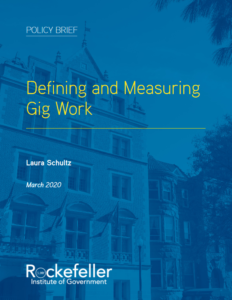April
2020
April 7, 2020
From the Field
Some States Much Better Prepared than Others for Recession
The Center on Budget and Policy Priorities (CBPP) examines the economic preparedness of each state in the context of a COVID-19 recession in its new report, Some States Much Better Prepared Than Others for Recessions. Evaluating four indicators of preparation—state budget reserves, unemployment insurance systems, Medicaid programs and affordable higher education—CBPP found that “no state scores among the nation’s top ten in all four of the categories.” The report includes an interactive map to identify indicators of economic resilience in your own state.
Philanthropy’s Role in Responding to COVID-19
WolfBrown’s first article in a new series, Navigating the Crisis, outlines the difficult choices that lie ahead for institutional funders during the COVID-19 pandemic. A Sector in Peril: Philanthropy’s Role in Responding to COVID-19 suggests how funders can prepare, from reprioritizing limited funds for artist and organizational survival to developing and promoting creative policy initiatives that protect those most at risk. As a silver lining, WolfBrown suggests that if arts funders act collectively and intelligently, the arts sector stands to not only weather the crisis, but emerge stronger.
Engaging the Arts Across the Juvenile Justice System
In a special report, the Education Commission of the States examines how art programs—from traditional after-school programs to an “arts-as-a-workforce intervention program”—are especially valuable for youth with limited access to academic, personal and social resources. Combining research and program examples, Engaging the Arts across the Juvenile Justice System shows the power of arts programming and education to prevent youth from engaging in harmful behavior and support those who are already in the juvenile justice system. Beyond providing additional resources, the final section of the report covers new federal and state policy that integrates the arts with juvenile justice and education.
Defining and Measuring Gig Work
The Rockefeller Institute of Government’s recent policy brief, Defining and Measuring Gig Work, defines what constitutes gig work and provides an overview of the gig economy, in which many artists participate. Comparing the gig workforce’s size relative to the rest of the labor force, the policy brief found that 3 in 10 workers participated in gig work over the past month, and more than a third of the U.S. workforce freelances at least part time. The brief provides a useful benchmark for future research on gig workers and a baseline to see how the gig economy will change following the COVID-19 crisis.
recent policy brief, Defining and Measuring Gig Work, defines what constitutes gig work and provides an overview of the gig economy, in which many artists participate. Comparing the gig workforce’s size relative to the rest of the labor force, the policy brief found that 3 in 10 workers participated in gig work over the past month, and more than a third of the U.S. workforce freelances at least part time. The brief provides a useful benchmark for future research on gig workers and a baseline to see how the gig economy will change following the COVID-19 crisis.
In this Issue
From the President and CEO
State to State
- Massachusetts, Delaware, Rhode Island: Sustaining Public Engagement during COVID-19
- Kentucky, Maryland, North Carolina: Virtual Marketplaces and COVID-19
- Utah, California: COVID-19 State Impact Research
- Maine, Arizona, Colorado: COVID-19 Grant Adaptations
Legislative Update
The Research Digest
Announcements and Resources
More Notes from NASAA
SubscribeSubscribe
×
To receive information regarding updates to our newslettter. Please fill out the form below.
